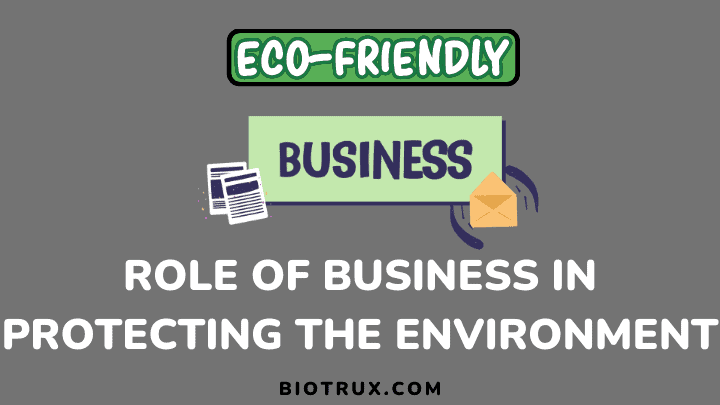Businesses have long been vital contributors to the global economy, but they also play an important role in protecting our environment.
From developing sustainable production methods to reducing their carbon footprints, businesses have the power to make a real and lasting impact on the planet.
It’s clear that businesses must take responsibility for protecting the environment — it benefits us all. But how? This article highlights the roles of businesses in protecting the environment.
By adhering to these roles, businesses can reduce their environmental impact and help put our planet on a path to sustainability. Let’s dive in.
1. Utilizing Digital Solutions that Minimize Paper Usage
Going paperless can help a business in its role of protecting the environment and money. Online platforms eliminate paper trails, reduce printing costs, and conserve resources like wood and water while maintaining convenience, accuracy, and efficiency.
Besides, the best part is that digital solutions don’t just help businesses become more eco-friendly; they can also help them become more profitable. It’s a win-win for everyone.
Simple everyday actions like this can accumulate over time to make a big difference in our planet’s health.
2. Switching to LED Lighting
Businesses can drive real change when it comes to protecting the environment. Not only are these energy-efficient technologies greener, but they are also likely to save businesses money over time, making them a great investment.
With LED lights, businesses can reduce their energy consumption by about 50 to 90%. That means not only can businesses save on their electricity bills, but they can also contribute to a healthier and cleaner atmosphere for us all.
With LED lighting, businesses can help reduce their carbon footprint and be part of something bigger. Plus, LED lights last longer than traditional bulbs, meaning businesses don’t need to replace them as often – saving them even more time and effort.
3. Help Staff Find Sustainable Transport Options
Businesses need to consider how their employees get to and from work, and whether they use environmentally friendly methods such as public transport or cycling. Encouraging staff to use these methods has several advantages.
Firstly, it reduces air pollution as fewer cars will be on the roads, which also helps reduce traffic congestion. Furthermore, it reduces the demand for fossil fuels which is better for the environment.
Finally, it can even save businesses money by reducing the need for parking spaces and other related costs. Businesses should look for ways to incentivize staff to use public transport or cycling.
For example, some companies offer discounted public transport passes or subsidized bike purchase schemes. These small incentives can make a huge difference in encouraging staff to use sustainable transport options.
4. Encouraging Green Product Design and Eco-Friendly Packaging
A business has an important role to play in protecting the environment and reducing the impact of its activities on the environment. One way they can do this is by encouraging green product design and eco-friendly packaging.
Green product design means using fewer materials, less energy, and fewer chemicals in the production process. Eco-friendly packaging can be made from recyclable materials or compostable materials that break down without harming the environment.
Using fewer resources, such as materials and energy, reduces the pollution created during production. Recyclable packaging helps reduce waste by allowing the materials to be reused instead of ending up in landfills or the bottom of oceans.
Businesses that demonstrate a commitment to sustainability can attract more customers and gain a competitive advantage in the marketplace.
5. Implementing Waste Management Systems
Proper waste management systems ensure that materials are collected, stored, and disposed of in a safe and environmentally friendly manner. The result is less waste going to landfills, less air pollution, and fewer hazardous materials entering our waterways.
By recycling or repurposing materials, businesses can also save money and reduce their dependence on new materials when they practice proper waste management.
By implementing effective waste management systems, businesses can also help reduce their carbon footprint and lead toward a more sustainable future.
These systems often include composting, reuse programs, and other measures designed to reduce waste and promote efficiency. Companies that successfully manage waste often set an example for others in the industry.
6. Providing incentives for customers who engage in sustainable behaviors
Businesses have a responsibility to help protect the environment, and providing incentives for customers who engage in sustainable behaviors is one way to do that. Such incentives can motivate customers to make better choices and reduce their environmental impact.
Incentives can be used to encourage people to use public transport, purchase eco-friendly products, recycle, conserve energy and water, or purchase renewable energy.
Businesses should consider offering discounts, rebates, free merchandise, or even free services for customers willing to invest in more sustainable options.
7. Partnering With Local Environmental Advocacy Groups or Environmental Charities
Through partnership, businesses can support the work of these organizations by providing financial and other resources to help them achieve their goals. In addition, businesses can gain access to expertise and research that can inform their strategies.
Furthermore, partnerships between businesses and these organizations can provide a platform for advocacy and policy development, bringing about real, tangible environmental change.
Partnerships with local environmental advocacy groups or environmental charities can demonstrate a company’s commitment to protecting the environment.
8. Encouraging Telecommuting and Reducing Travel
Telecommuting, or working from home, means that employees don’t need to travel daily to and from the office. This reduces their carbon footprint and the emissions from the vehicles they use to get to work.
Reducing travel also means that fewer resources are consumed for things such as petrol and electricity for public transport. Companies can also conserve electricity by allowing employees to work from home.
Overall, encouraging telecommuting and reducing travel is a practical role for a business to reduce its environmental impact. Business owners and employees benefit from it as it protects the environment, increases productivity, and reduces costs.
Therefore, businesses need to create policies that enable and encourage telecommuting to protect the environment and ensure the sustainability of their operations.
9. Investing in Energy-Efficient Technologies in the Workplace
A business has an important role to play in protecting the environment, and one of the ways it can do this is by investing in energy-efficient technologies.
Employing energy-efficient technology in the workplace can drastically reduce businesses’ energy consumption, reducing their carbon footprint. Energy-efficient technologies such as HVAC systems and smart thermostats can help lower energy costs while reducing greenhouse gas emissions.
Additionally, businesses can make use of renewable energy sources such as solar and wind power to reduce their impact on the environment further.
With the cost of these technologies decreasing, it is becoming more affordable for businesses to invest in them and become more environmentally friendly.
10. Implementing Sustainability Goals in Corporate Strategies and Objectives
The use of renewable energy, waste reduction, and environmentally friendly product development are all examples of sustainability initiatives. Implementing these goals helps businesses reduce their environmental impact, a crucial step in promoting sustainability.
Corporate sustainability goals also help businesses create ethical workplaces and demonstrate commitment to being eco-friendly. This can help attract customers who care about environmental issues and appreciate responsible companies.
Ultimately, businesses can use sustainability goals to create long-term positive impacts for their companies and the environment.

FAQs
What are some barriers that businesses face when trying to protect the environment?
Businesses face a few barriers to making their operations more sustainable and green. These include cost efficiency, access to resources, and regulatory compliance.
Can businesses help solve world pollution problems?
Yes. One way that businesses can help fight pollution is to reduce emissions from transportation, manufacturing, and other activities. Businesses should also invest in renewable energy sources such as solar, wind, hydro, and geothermal.
Does a business have a moral obligation to protect the environment?
Yes. Businesses have a moral obligation to protect the environment. Businesses must protect their employees, customers, communities, and other stakeholders by protecting the environment.
Final Thoughts
Businesses need to take a proactive role in preserving and protecting the environment. The major role of a business (sustainability-wise) is to recognize its responsibility toward protecting the environment, and ensure that its operations are environmentally friendly.
This includes adopting sustainable practices, reducing emissions, and finding ways to be more efficient with resources. By implementing these measures, businesses can help create a better and cleaner world for future generations.
If you’re an environmental enthusiast willing to contribute to a greater cause, read the advocating for the environment article.
Thanks for reading.

